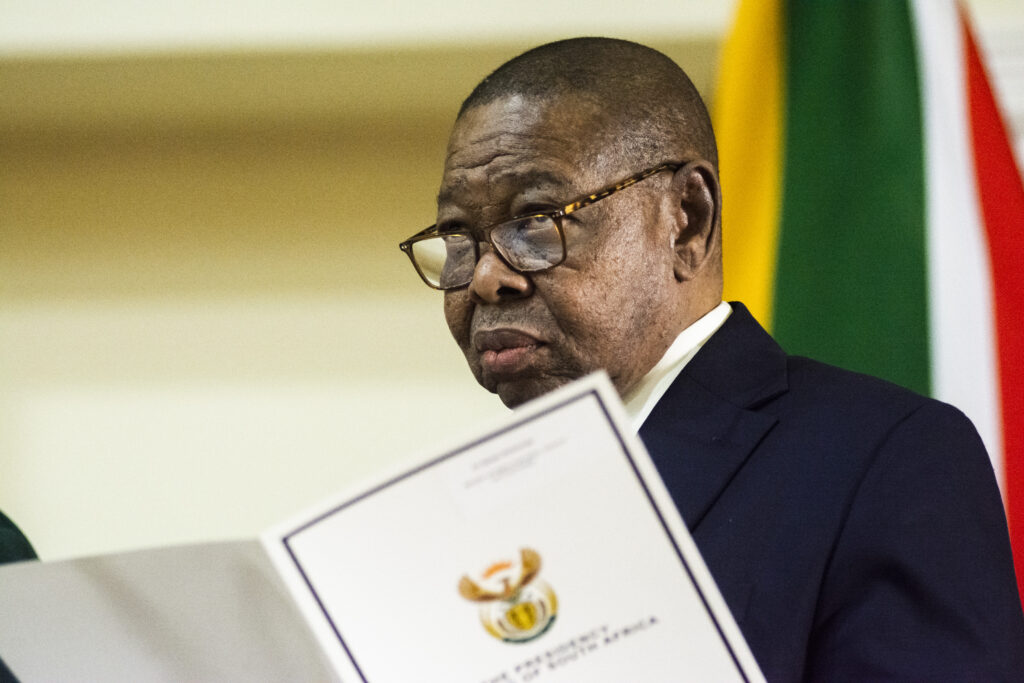Squeeze: Wits University students protest over funding uncertainty after Minister Blade Nzimande said the scheme faces a shortfall. (Michele Spatari/AFP)
A protracted higher education funding crisis could put further strain on an already fraught labour market, experts say. Earlier this week, Higher Education Minister Blade Nzimande said the National Student Financial Aid Scheme (NSFAS), which provides much-needed financial support to poor and working-class undergraduate students, faces a funding shortfall.
Nzimande pointed to two reasons for the shortfall: Covid-19, which has resulted in more eligible NSFAS applicants because of job losses in their households, and budget cuts that started before the pandemic wreaked havoc on the economy.
According to the treasury’s budget vote documents, the cabinet has approved reductions to the department of higher education’s baseline amounting to R24.6-billion over the medium term. This requires cutting NSFAS funding for loans and bursaries by R6.8-billion.
These reductions will probably lead to a decrease in the number of first‐year enrolments, the treasury document notes. “Although this will have a longer‐term impact on the number of new graduates emerging from the system, it is necessary to ensure that institutions remain sustainable and can offer quality education,” the treasury said.
On Thursday, following deadly police intervention during a protest by Wits University students, Nzimande explained that cabinet agreed that funding should be reprioritised to ensure that all deserving NSFAS-qualifying students receive funding for in 2021. Further reprioritisation can only be considered as part of the medium term budget process of government, which takes place later this year, he said
Experts say that if the scheme’s funding woes are not solved, there could be added pressure on a labour market already dealing with a high rate of youth unemployment.
Economics professor Ingrid Woolard said it is difficult to know how the NSFAS crisis will play out.
But, she added: “If a solution is not found, then this will have knock-on effects in the labour market. Some young people who had planned further study will instead try to seek work in a very weak economy.”
According to Statistics South Africa’s most recent quarterly labour force survey, the unemployment rate for people between the ages of 15 and 24 was 63.2% at the end of 2020. This is up by more than 5% compared with the same period in 2019.
 Higher Education Minister Blade Nzimande. (Waldo Swiegers/Bloomberg via Getty Images
Higher Education Minister Blade Nzimande. (Waldo Swiegers/Bloomberg via Getty Images
The Covid-19 economic turmoil hit young workers hardest. According to global data from the International Labour Organisation (ILO), job losses were 8.7% higher for people in the 15 to 24 age group than for older workers. The pandemic also resulted in young people becoming more disconnected from the labour market, the ILO found.
Woolard noted that in South Africa, there are already about 5.5-million people under the age of 30 who are not in employment, education or training and the NSFAS crisis “will exacerbate that problem”.
The limited funding for poor students will inevitably worsen inequality in the labour market and in society as a whole, Woolard said.
“Young people from better-off families with access to family resources or credit markets will be able to attend university while those without will not be able to proceed to higher education.”
Last week the Mail & Guardian reported that funding and infrastructural woes at NSFAS had left some students with nowhere to turn.
RELATED
Stanlib chief economist Kevin Lings said the government is in a difficult position because of the fiscal climate.
“Whatever area you look at, you can see there is significant financial pressure. It is not particular to youth employment,” he said.
“It is just more and more the reality of South Africa’s fiscal position; the government’s deteriorated financial position is starting to impact a broader range of social activities.”
Lings said the message from Finance Minister Tito Mboweni’s 2021 budget, which has been criticised for entrenching austerity, is that the country needs economic growth and to solve its unemployment crisis. Recent gross domestic product numbers indicate that the economy is recovering from the Covid-19 onslaught, but only after it contracted by 7% in 2020.
RELATED
“The question is, how quickly can we do that — how quickly can we lift growth? Because in the short-term, it is going to intensify,” Lings added.
Gilad Isaacs, the director of the Institute for Economic Justice, said a shortage of funding would definitely exacerbate unequal access to higher education, which in the long-term could decrease the number of skills in the economy.
But just because people are graduating does not mean they will be employed, he said. “There is not a one to one correlation with the unemployment rate.”
Isaacs added that during economic downturns, when jobs are more difficult to come by, “a good thing for young people to be able to do is go and study. Because it gives time for the economy to recover, and the absorption of the economy in four years might be better than it is now.”
Experience shows that recessionary periods should be used for upskilling and reskilling to cushion the jobless, he said.
In its study on the effects of Covid-19 on youth employment, the ILO recommended that policymakers support education and skills development.
“By combining support for the entry or re-entry of vulnerable young people to education, training and employment with macroeconomic stabilisation, such programmes can promote employment recovery as a whole,” the ILO said.